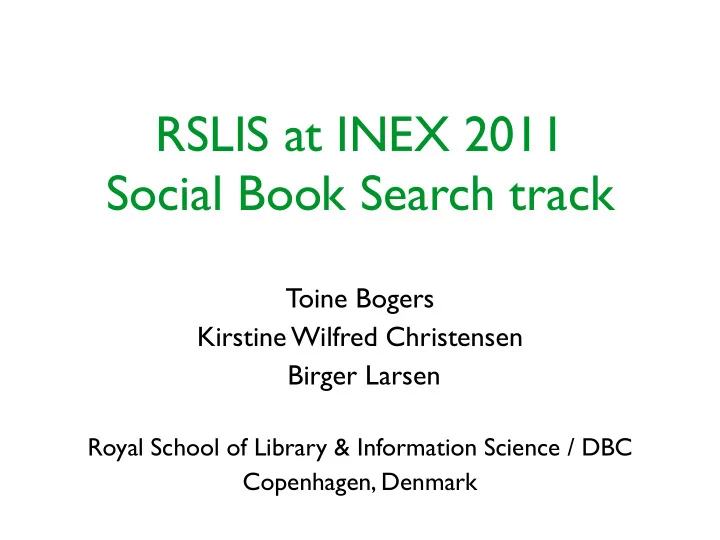

RSLIS at INEX 2011 Social Book Search track Toine Bogers Kirstine Wilfred Christensen Birger Larsen Royal School of Library & Information Science / DBC Copenhagen, Denmark
Outline • Methodology - Pre-processing - Indexing & topics • Content-based retrieval • Social re-ranking • Submitted runs • Discussion
Methodology
Pre-processing • Removed 22 XML fields not likely to contribute to retrieval - Example: <image>, <listprice>, <binding> • Retained 19 content-bearing XML fields - <isbn>, <title>, <publisher>, <editorial>, <creator>, <series>, <award>, <character>, <place>, <blurber>, <epigraph>, <firstwords>, <lastwords>, <quotation>, <dewey>, <subject>, <browseNode>, <review>, and <tag>
Indexing • Created six different indexes - All fields (all-doc-fields) ‣ All 19 content-bearing XML fields - Metadata (metadata) ‣ Immutably tied to the book, provided by publisher ‣ <title>, <publisher>, <editorial>, <creator>, <series>, <award>, <character>, and <place>
Indexing - Content (content) ‣ Fields that contain some part of the book text ‣ <blurber>, <epigraph>, <firstwords>, <lastwords>, and <quotation> - Controlled metadata (controlled-metadata) ‣ Subject descriptions curated by library professionals ‣ <browseNode>, <dewey>, and <subject>
Indexing - Tags (tags) ‣ User-generated subject descriptions ‣ <tag> - User reviews ‣ Book-centric index reviews (all reviews belonging to the same book aggregated into a single representation) ‣ Review-centric index reviews-split (each review indexed separately)
Topics • Four different topic representations - Title (title) - Group (group) - Narrative (narrative) - All three topic fields combined (all-topic-fields)
Content-based retrieval
Approach • Pairwise combinations of all indexes and topic representations - 6 indexes × 4 representations = 24 different runs • Algorithm - Language modeling using JM smoothing - λ optimized in steps of 0.1 in [0, 1] range - Stopword filtering & Krovetz stemming
Results Topic fields Document fields title narrative group all-topic-fields metadata 0.2756 0.2660 0.0531 0.3373 content 0.0083 0.0091 0.0007 0.0096 controlled-metadata 0.0663 0.0481 0.0235 0.0887 tags 0.2848 0.2106 0.0691 0.3334 reviews 0.3020 0.2996 0.0773 0.3748 all-doc-fields 0.2644 0.3445 0.0900 0.4436
Social re-ranking
Approach • Tags - Tag index tags performed well • Reviews - Book-centric index reviews performed well - What about the review-centric index reviews- split?
Approach • Review-centric retrieval 1. Retrieve individual reviews 2. Aggregate scores for individual reviews into a single relevance score for each occurring book ‣ Similar to results fusion in IR! ‣ Can use methods like CombMAX, CombSUM, etc.
Approach - Unweighted review fusion ‣ CombMAX, CombSUM, and CombMNZ - Weighted review fusion ‣ Weighting based on review helpfulness score weighted ( i ) = score org ( i ) × helpful vote count total vote count ‣ Weighting based on normalized book ratings score weighted ( i ) = score org ( i ) × r 5
Results Topic fields Runs title narrative group all-topic-fields CombMAX 0.3117 0.3222 0.0892 0.3457 CombSUM 0.3377 0.3185 0.0982 0.3640 reviews-split CombMNZ 0.3350 0.3193 0.0982 0.3462 CombMAX - Helpfulness 0.2603 0.2842 0.0722 0.3124 CombSUM - Helpfulness 0.2993 0.2957 0.0703 0.3204 CombMNZ - Helpfulness 0.3083 0.2983 0.0756 0.3203 CombMAX - Ratings 0.2882 0.2907 0.0804 0.3306 CombSUM - Ratings 0.3199 0.3091 0.0891 0.3332 CombMNZ - Ratings 0.3230 0.3080 0.0901 0.3320 reviews 0.3020 0.2996 0.0773 0.3748
Submitted runs
Submitted runs • Four submitted runs - Run 1: title.all-doc-fields - Run 2: all-topic-fields.all-doc-fields - Run 3: title.reviews-split.CombSUM - Run 4: all-topic-fields.reviews-split.CombSUM
Results • Best-performing runs - Run 2: all-topic-fields.all-doc-fields - Run 4: all-topic-fields.reviews-split.CombSUM • Means there is hope for the social re-ranking approach...
Discussion
What did we learn? • Best performance when combining all available information - Support for principle of polyrepresentation ‣ Ingwersen (1996) and Belkin (1993) • User-generated metadata ≫ curated metadata • Book-centric vs. review-centric undecided - Helpfulness and ratings do not contribute enough in the current approach
Questions?
Recommend
More recommend